博士研究生英语精读教材翻译_1-10课_(中科院)
博士研究生英语精读教材翻译7-10课(中科院)

第7课饮毒和摄取营养物质Drinking Hemlock and Other Nutritional Matters在一个阴冷的早晨,我早早地起来之后心想(诚然一项情愿地)应该适时打开电视与外界交流一下。
令我大吃一惊的是,电视上有位几年前著名的影星正在讲述糖的害处。
这位前好莱坞偶像强烈地谴责这种乙醣二聚体,特别是它的纯化的晶体形态。
她斥之为“非天然食品”,这种称呼极大地损坏了进行光合作用的甘蔗和甜菜的形象。
给人的感觉就像一位庄严的法官永久地宣判一种“反常行为”一样。
我马上就被这位伟大的女士的讨伐行动吸引住了,并且心里一直在嘀咕“讨厌蔗糖”,同时调好一种非天然的咖啡豆提取物并且往里面扔了一片高度合成的糖精。
过了一会儿,当睡意消去时,对原因的怀疑取代了情绪的自信,我开始纳闷,多年来我的同事们一直在生化营养物方面迷惑不解,我的电影女主角在这方面那么有把握,她的自信从何得来?或许所有这些脏乱的实验工作,如碾磨和提炼组织以及其他类似无聊的实验室里的工作,都不是获取“真理”的最便捷的途径。
也许我们这群穿着白大褂的人忽略了一条通往真理的神秘通道,在这里一些人靠令人无法理解的洞察力来发现有关营养学的“真正的”知识,这些知识改变了其信奉者的生活。
所有这一切都使唤起了生物医学家们一次次频繁痛苦的经历,这种经历就像反复出现的噩梦一样时刻萦绕在心头。
某一回是在鸡尾酒会或者别的社交聚会上,有人出现在人群中,然后就对“好营养”问题开始慷慨陈词。
所阐述的“事实”与众所周知的代谢途径、细胞组织生理学、酶学和常识经常不一致。
如果有听众斗胆提出疑问,“你是怎么知道的?”迎接他或她的眼神就像当年哥伦布问“你怎么知道,世界是平的”时所受的那样。
营养学似乎很像政治,对此人人都是专家。
于是,百姓大众就以为,一个人不管他熟知一门复杂学科的多少事实和理论,他多年受到的教育,与不费吹灰之力就可获取的知识相比,仍显得苍白而无用。
所描述的情况绝非仅限于食物的选择,当然我觉得还没有准备好要去介入蔗糖辩论。
大学英语精读2(1-10)课后翻译

大学英语精读2(1-10)课后翻译大学英语精读2(1—10单元课后翻译)Unit11、她砰地关上门,一声不吭地走了,他们之间那场争执就此结束。
Their argument ended when she slammed the door and left without a word.1.出席晚宴的客人对那个美国人威严的语气感到有点意外。
The guests at the dinner party were slightly surprised at the commanding tone of the American.2.约翰尼已长大成熟,不再害怕独自呆在家里了。
Johnny has outgrown the fear of staying at home alone.3.当全部乘客都向出口处(exit) 走去时,他却独自留在座位上,好像不愿意离开这架飞机似的。
While all the other passengers made for the exit, he alone remained in his seat as if unwilling to leave the plane.4.这封信必须交给威尔逊博士本人。
The letter is to be handed to Dr. Wilson himself.5.南希虽然很想参加辩论,但腼腆得不敢开口。
While she felt like joining in the argument, Nancy was too shy to open her mouth。
6.你觉得什么时候最有可能在家里找到他?What do you think is the likeliest time to find him at home?7.猎人一看见有只狐狸从树丛中出现并向他设下(lay) 的陷阱(trap) 方向跑去,脸上顿时闪出了兴奋的表情。
The hunter’s face lit up with excitement as soon as he saw a fox emerge from among the bushes and run in the direction of / make for the trap he had laid.Unit21)会上有人建议任命一个十一人委员会来制定新章程。
研究生英语教材阅读课文翻译

第一单元:Vocabulary Study:1.permanent2.had assembled3.discharging4.meekly5.apprentice6.partiality7.obscure8.exalted9.intruding 10cordially 11ambition 12.gallantlyCLOZE:BDCAB ADABB DBDAA CCDCB、Translation:1.His dream of becoming a footble star faded out as timewent by .2.A Boeiay/Boeing 747 aircraft didn’t gain enough height to climb the mountain.In a twinking ,it crash into the mountain and blew up .No one survied in the accident.3. Student have easy access to the resource in the libracy. so they are supposed to make the best of it .4.Titanic,the most luxurious ship in the world at the time .hit an icebery when she was under the way to the USA.Consequently, the ship sank into Atlantic Ocean and thousands of people died in this shipwreck.5.Every summer, all the tourists pour into this famous beach ,they packed like sardines on the beach to enjoy the sunshine.6.They have been to ST louis once and have a vague konwledge of its wonderful food ,but the day of their glory is over now ,they laspse into a humble silence and learn to disappear when the ruthless lindneer approches.第二单元:Vocabulary Study1.advocated2.extravagant3.vulnerable4.guru5.potential6.dispel7.shunned8.acclaimed9.enthusiasts10.stave off11.attendant 12.eventured CLOZE: CBDAD CDBAC BBCCD ABCAC.Translation:1.Some cyber gurus claim that internet will precent wars reduce pollution and combat various of inquality.2.Although,internet can undernible fosters communication, It will not put an end to wars . since wars are by no means cause by the failure of different people to understand each other equlty.3.The internet can help reduce energy comsumption and pollution ,only if doing things online replace realworld activies.4.The poor are not shunning the internet because they cannot affort it the problem is that they lack the skills to exploit it efficiently, therefore, it make more sense to improve universal literacy than universal.5.Thanks to internet ,income inequality between people doing similar jods in different countries has been reduced. however, the inequality between information works in poor countries and their porrest compatroits has been increased.6.If human nature remains stablely changed ,desipte the claim of technologist predict ,humanity cannot simply incent away its failing.第三单元:Vocabulary Study1.sank2.clear3.rainfall4.drought5.Flowering6.loose7.pores8.graze9.spine 10.trapped 11.venture 12.fertileCLOSE: CBDAB DBCCA ACDAC CADABTranslation:1.Many stuies indicate that thedesert air is so dry that it contains any moisture.2.Although the children form age 5 to 16 must go to school in Britain according to the laws ,about 1%of the children still can not read when they have primary school.3.After heared the news ,I knew i fell vestless again within a fornight .4.We think unanimouly to answer the question ,we must look more closely at the faces.5.Though out the world, goverment at all levels are taking effectively measures to prevent environment pollution.6.Some people think that the objective items ,such as multiple choices, should be used for an examation, others donot agree, because they believe that this kind test has some bad effect on students leaning.第四单元Vocabulary Study1.Physical2.accumulation3.diversity4.precipitated5.muscular6.pathological7.symptomatic8.vigorous9.psychologically 10.Anxiety 11.restored 12.refreshedCLOSE: ACDCB BCCBD CDCBA ADCDBTranslation:1.I find that walking along the quiet lake can provide refreshment form a day is sedentary jod.2.Exercising and relexing youself is often prescribed as an effective cure for fatigue.3.The less active you are ,the faster aging process accelerates and the more vulnerable you became to physical and psychological problems.4.We are collecting money for repairs to the chur .if any of you would like to make a contribution ,we shall be most grateful.5.The scientist are currently focus on making experiment,in hope of finding effective methods to cure cancers.5.The speach that the chairman delivered at the conferences made much sense to regain the confidence of empolyees.第五单元Vocabulary Study1.uniform2.distinguish/recognize3.ascertained4.recognized5.unique6.outlet7.tactile8.rigid9.secure 10.acquisition 11.fruitful 12.foundationCLOSE :ADBBA DDCBA CCADB DCABATranslation:1.Tt is generally accepted that the upbring of the childild with the home is closely related to the education of the child in school.2.Jennifer is the chief of personal for the NewYork Heracal Tribune ,where she is also responsible editcrical work in the fied of public relations .3. It was two years ago that Jeff met Rose at his sister"s birthaday party ,they had been communited with each other by email since then the more Jeff know Rose ,the more he like her.4. The measure is effective not only in providing job opportunity for the laid-off works ,but also in limiting price increases.5Similarly , they inefficiency treated the political and economical back ground of the cinspiracy.6Tremendacs capital has met the needs of rapid economic growth on one hand and has caused the in flation on the other hand.第六单元Vocabulary Study1.As a matter of fact2.are plagued3.versus4.have ben reflecting on5.positive 6is implementing 7.will enroll 8.has been enriched 9.aspiration 10.academic 11.well-informed mitment toCLOSE:: BBACB BCAAD CBABD BBCCBTranslation:1.Passing the English examination should enhance your chances of getting the post.2.The discovery of god in the valley will enrish the mountain area.3. Only when police confronted her with evidence ,did she admited that she had stolen the money.4. The meting will afford you an opportunity of hearing good public speakers.5. An offical statement laid to rest the remain fears aout possible redundancies in the industry.6.MARY IS pretty bright ,ASa matter of ,her teacher told me that she is certain to get a university place this year.第七单元:Vocabulary Study1.downsized2.dynamic3.yield4.had guaranteed5.inflict6.budget7.priority8.accelerating9.shirk 10.vitally 11.jiopardize 12.criteria CLOSE:CDBCA BCBBA DDABA BCCDCTranslation:1.Black people in this area complained to the goverment that they had been subjected to repeated racial attacks from the local police officers.2.The goverment officers are inclined to apply the science and technology to short -term projects ,which is benifical to scientific development.3.The precious manager did not want to invest time and money in training the employees who could leave the company any times,an a result of which ,there was a scrious talent drain.4.We are collecting money for repairs to the church ,if any of you would like to make a contribution ,we shall be most grateful .5.The scientist are currently focus on making expeiments,in hope of finding efctive methods to cure cancers.6.The speach that the chairman delivered at the conferences made much sense to regain the confidence of empolyees.第八单元Vocabulary Study1.acid2.shaded3.knock-on4.Drain5.banks6.spacing7.band8.needles9.filter 10.altitudes 11.variables anismCLOSE: CACDA BAACD DBDCB ACDABTranslation:1.Mexico city is one of the most popucated cities in the world.2.The finding shows that a substantial difference between the opinions of men and woman.3. I can’t r emember whether i left my credit card home or in the car .4.We cannot assume the suspects to be gulity simly because they are deliveed to remain silent.5.The main question that faces Chinese economists at present is how to use the price levers and the competition system to direct resources into areas which yield better returns.6.It is assumed in the next 20 years the most surprisiing development will take pace in the space flight ,but now space craft a being developed and they can be used many times instand of only one.第九单元:Vocabulary Study1applied 2repentance 3penetrated 4monkey-like 5contrast 6impressed 7passionate 8awakened 9succeeded 10blossoms 11expectant 12opportunityCLOSE: CDBAA DABCC DBCBC DABBATranslation:1.On those days and nights when I was waiting for the results of the Entrance Examination,my heart was filled with wonder(or uncertainty).Iwondered what the fouture held for me,of surprise and excitement or disappointment and sorrow.2.The little girl ran swiftly to catch up with her mother and stretched out her hand to her mother,crying for more candies and drinks.But the mother persisted that they had bought encough.3.His wife was sent into the operation room.He walked to and fro outside,smoking one cigarette after another.When he saw the door opened,he felt a thrill of tenseness.4.Under the gaze of his colleagues,he flushed with embarrassment and bowwed hi head.He casually took up a newspaper and hid hi face behind it,petending to be reading it.5.They fixed all their attention on the research project on hand.They believed that as long as they didn’t lose heart,they woule succeed in thesse experiments in time.6.She had just given birth to an infant when her husband left/deserted her.In despair,she shut herself and the infant in aroom,claiming that they would perish together.Thanks to the policemen who came in time,the mother and the daughter escaped death by a hair’s breath(or had a narrow escape).第十单元:Vocabulary Study:1.in his own right2.make good use of3.ready for4.went forth5.are looking forward to6.figure out7.assembled8.were dissolving9.withstand 10.controversy 11.an obstacle 12.resembleCLOSE:CABBD ADADA DDCCC BCADATranslation:1.we must figure out how to solve the tissue-rejecuion problem.2.his behavior under fire approved him a man of courage.3.In addition to the impressiveness of the settings,there is aue of the camera that at times seems magical.4.At first,no ready technical data were available,but we managed to go without.5.She has some difficulty in giving shape to her ideas.But she resembles her mother in the way she moves her hands when she talks.6.The most part of their designs corresponds to actual needs and regulations on environmental demand,the other part needs reconsidering.一个小男孩的梦想马克吐温1我小的时候,我们那密西西比河西岸的村镇上,玩伴们都只有一个水恒的志愿。
大学英语精读第三版第一册Book1Unit1~Unit10翻译
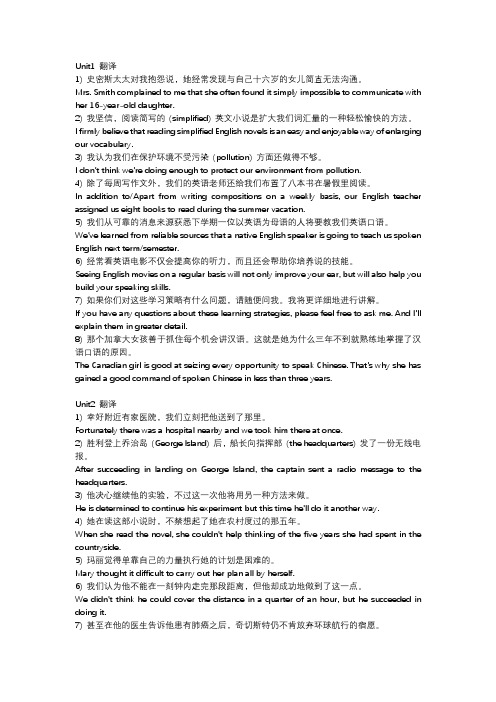
Unit1 翻译1) 史密斯太太对我抱怨说,她经常发现与自己十六岁的女儿简直无法沟通。
Mrs. Smith complained to me that she often found it simply impossible to communicate with her 16-year-old daughter.2) 我坚信,阅读简写的(simplified) 英文小说是扩大我们词汇量的一种轻松愉快的方法。
I firmly believe that reading simplified English novels is an easy and enjoyable way of enlarging our vocabulary.3) 我认为我们在保护环境不受污染(pollution) 方面还做得不够。
I don’t think we’re doing enough to protect our environment from pollution.4) 除了每周写作文外,我们的英语老师还给我们布置了八本书在暑假里阅读。
In addition to/Apart from writing compositions on a weekly basis, our English teacher assigned us eight books to read during the summer vacation.5) 我们从可靠的消息来源获悉下学期一位以英语为母语的人将要教我们英语口语。
We’ve learned from reliable sources that a native English speaker is going to teach us spoken English next term/semester.6) 经常看英语电影不仅会提高你的听力,而且还会帮助你培养说的技能。
Seeing English movies on a regular basis will not only improve your ear, but will also help you build your speaking skills.7) 如果你们对这些学习策略有什么问题,请随便问我。
中科院博士研究生英语精读教材课文原文及翻译

第1课知识的悖论The Paradox of KnowledgeThe greatest achievement of humankind in its long evolution from ancient hominoid ancestors to its present status is the acquisition and accumulation of a vast body of knowledge about itself, the world, and the universe. The products of this knowledge are all those things that, in the aggregate, we call "civilization," including language, science, literature, art, all the physical mechanisms, instruments, and structures we use, and the physical infrastructures on which society relies. Most of us assume that in modern society knowledge of all kinds is continually increasing and the aggregation of new information into the corpus of our social or collective knowledge is steadily reducing the area of ignorance about ourselves, the world, and the universe. But continuing reminders of the numerous areas of our present ignorance invite a critical analysis of this assumption.In the popular view, intellectual evolution is similar to, although much more rapid than, somatic evolution. Biological evolution is often described by the statement that "ontogeny recapitulates phylogeny"--meaning that the individual embryo, in its development from a fertilized ovum into a human baby, passes through successive stages in which it resembles ancestral forms of the human species. The popular view is that humankind has progressed from a state of innocent ignorance, comparable to that of an infant, and gradually has acquired more and more knowledge, much as a child learns in passing through the several grades of the educational system. Implicit in this view is an assumption that phylogeny resembles ontogeny, so that there will ultimately be a stage in which the accumulation of knowledge is essentially complete, at least in specific fields, as if society had graduated with all the advanced degrees that signify mastery of important subjects.Such views have, in fact, been expressed by some eminent scientists. In 1894 the great American physicist Albert Michelson said in a talk at the University of Chicago:While it is never safe to affirm that the future of Physical Science has no marvels in store even more astonishing than those of the past, it seems probable that most of the grand underlying principles have been firmly established and that further advances are to be sought chiefly in the rigorous application of these principles to all the phenomena which come under our notice .... The future truths of Physical Science ate to be looked for in the sixth place of decimals.In the century since Michelson's talk, scientists have discovered much more than the refinement of measurements in the sixth decimal place, and none is willing to make a similar statement today. However, many still cling to the notion that such a state of knowledge remains a possibility to be attained sooner or later. Stephen Hawking, thegreat English scientist, in his immensely popular book A Brief History of Time (1988), concludes with the speculation that we may "discover a complete theory" that "would be the ultimate triumph of human reason--for then we would know the mind of God." Paul Davies, an Australian physicist, echoes that view by suggesting that the human mind may be able to grasp some of the secrets encompassed by the title of his book The Mind of God (1992). Other contemporary scientists write of "theories of everything," meaning theories that explain all observable physical phenomena, and Nobel Laureate Steven Weinberg, one of the founders of the current standard model of physical theory, writes of his Dreams of a Final Theory (1992).Despite the eminence and obvious yearning of these and many other contemporary scientists, there is nothing in the history of science to suggest that any addition of data or theories to the body of scientific knowledge will ever provide answers to all questions in any field. On the contrary, the history of science indicates that increasing knowledge brings awareness of new areas of ignorance and of new questions to be answered.Astronomy is the most ancient of the sciences, and its development is a model of other fields of knowledge. People have been observing the stars and other celestial bodies since the dawn of recorded history. As early as 3000 B.C. the Babylonians recognized a number of the constellations. In the sixth century B.C., Pythagoras proposed the notion of a spherical Earth and of a universe with objects in it chat moved in accordance with natural laws. Later Greek philosophers taught that the sky was a hollow globe surrounding the Earth, that it was supported on an axis running through the Earth, and chat stars were inlaid on its inner surface, which rotated westward daily. In the second century A.D., Ptolemy propounded a theory of a geocentric (Earth-centered) universe in which the sun, planets, and stars moved in circular orbits of cycles and epicycles around the Earth, although the Earth was not at the precise center of these orbits. While somewhat awkward, the Ptolemaic system could produce reasonably reliable predictions of planetary positions, which were, however, good for only a few years and which developed substantial discrepancies from actual observations over a long period of time. Nevertheless, since there was no evidence then apparent to astronomers that the Earth itself moves, the Ptolemaic system remained unchallenged for more than 13 centuries.In the sixteenth century Nocolaus Copernicus, who is said to have mastered all the knowledge of his day in mathematics, astronomy, medicine, and theology, became dissatisfied with the Ptolemaic system. He found that a heliocentric system was both mathematically possible and aesthetically more pleasing, and wrote a full exposition of his hypothesis, which was not published until 1543, shortly after his death. Early inthe seventeenth century, Johannes Kepler became imperial mathematician of the Holy Roman Empire upon the death of Tycho Brahe, and he acquired a collection of meticulous naked-eye observations of the positions of celestial bodies chat had been made by Brahe. On the basis of these data, Kepler calculated that both Ptolemy and Copernicus were in error in assuming chat planets traveled in circular orbits, and in 1609 he published a book demonstrating mathematically chat the planets travel around the sun in elliptical orbits. Kepler's laws of planetary motion are still regarded as basically valid.In the first decade of the seventeenth century Galileo Galilei learned of the invention of the telescope and began to build such instruments, becoming the first person to use a telescope for astronomical observations, and thus discovering craters on the moon, phases of Venus, and the satellites of Jupiter. His observations convinced him of the validity of the Copernican system and resulted in the well-known conflict between Galileo and church authorities. In January 1642 Galileo died, and in December of chat year Isaac Newton was born. Modern science derives largely from the work of these two men.Newton's contributions to science are numerous. He laid the foundations for modem physical optics, formulated the basic laws of motion and the law of universal gravitation, and devised the infinitesimal calculus. Newton's laws of motion and gravitation are still used for calculations of such matters as trajectories of spacecraft and satellites and orbits of planets. In 1846, relying on such calculations as a guide to observation, astronomers discovered the planet Neptune.While calculations based on Newton's laws are accurate, they are dismayingly complex when three or more bodies are involved. In 1915, Einstein announced his theory of general relativity, which led to a set of differential equations for planetary orbits identical to those based on Newtonian calculations, except for those relating to the planet Mercury. The elliptical orbit of Mercury rotates through the years, but so slowly that the change of position is less than one minute of arc each century. The equations of general relativity precisely accounted for this precession; Newtonian equations did not.Einstein's equations also explained the red shift in the light from distant stars and the deflection of starlight as it passed near the sun. However, Einstein assumed chat the universe was static, and, in order to permit a meaningful solution to the equations of relativity, in 1917 he added another term, called a "cosmological constant," to the equations. Although the existence and significance of a cosmological constant is still being debated, Einstein later declared chat this was a major mistake, as Edwin Hubble established in the 1920s chat the universe is expanding and galaxies are receding fromone another at a speed proportionate to their distance.Another important development in astronomy grew out of Newton's experimentation in optics, beginning with his demonstration chat sunlight could be broken up by a prism into a spectrum of different colors, which led to the science of spectroscopy. In the twentieth century, spectroscopy was applied to astronomy to gun information about the chemical and physical condition of celestial bodies chat was not disclosed by visual observation. In the 1920s, precise photographic photometry was introduced to astronomy and quantitative spectrochemical analysis became common. Also during the 1920s, scientists like Heisenberg, de Broglie, Schrodinger, and Dirac developed quantum mechanics, a branch of physics dealing with subatomic particles of matter and quanta of energy. Astronomers began to recognize that the properties of celestial bodies, including planets, could be well understood only in terms of physics, and the field began to be referred to as "astrophysics."These developments created an explosive expansion in our knowledge of astronomy. During the first five thousand years or more of observing the heavens, observation was confined to the narrow band of visible light. In the last half of this century astronomical observations have been made across the spectrum of electromagnetic radiation, including radio waves, infrared, ultraviolet, X-rays, and gamma rays, and from satellites beyond the atmosphere. It is no exaggeration to say chat since the end of World War II more astronomical data have been gathered than during all of the thousands of years of preceding human history.However, despite all improvements in instrumentation, increasing sophistication of analysis and calculation augmented by the massive power of computers, and the huge aggregation of data, or knowledge, we still cannot predict future movements of planets and other elements of even the solar system with a high degree of certainty. Ivars Peterson, a highly trained science writer and an editor of Science News, writes in his book Newton's Clock (1993) that a surprisingly subtle chaos pervades the solar system. He states:In one way or another the problem of the solar system's stability has fascinated and tormented asrtonomers and mathematicians for more than 200 years. Somewhat to the embarrassment of contemporary experts, it remains one of the most perplexing, unsolved issues in celestial mechanics. Each step toward resolving this and related questions has only exposed additional uncertainties and even deeper mysteries.Similar problems pervade astronomy. The two major theories of cosmology, general relativity and quantum mechanics, cannot be stated in the same mathematical language, and thus are inconsistent with one another, as the Ptolemaic and Copernicantheories were in the sixteenth century, although both contemporary theories continue to be used, but for different calculations. Oxford mathematician Roger Penrose, in The Emperors New Mind (1989), contends that this inconsistency requires a change in quantum theory to provide a new theory he calls "correct quantum gravity."Furthermore, the observations astronomers make with new technologies disclose a total mass in the universe that is less than about 10 percent of the total mass that mathematical calculations require the universe to contain on the basis of its observed rate of expansion. If the universe contains no more mass than we have been able to observe directly, then according to all current theories it should have expanded in the past, and be expanding now, much more rapidly than the rate actually observed. It is therefore believed that 90 percent or more of the mass in the universe is some sort of "dark matter" that has not yet been observed and the nature of which is unknown. Current theories favor either WIMPs (weakly interacting massive particles) or MACHOs (massive compact halo objects). Other similar mysteries abound and increase in number as our ability to observe improves.The progress of biological and life sciences has been similar to that of the physical sciences, except that it has occurred several centuries later. The theory of biological evolution first came to the attention of scientists with the publication of Darwin's Origin of Species in 1859. But Darwin lacked any explanation of the causes of variation and inheritance of characteristics. These were provided by Gregor Mendel, who laid the mathematical foundation of genetics with the publication of papers in 1865 and 1866.Medicine, according to Lewis Thomas, is the youngest science, having become truly scientific only in the 1930s. Recent and ongoing research has created uncertainty about even such basic concepts as when and how life begins and when death occurs, and we are spending billions in an attempt to learn how much it may be possible to know about human genetics. Modern medicine has demonstrably improved both our life expectancies and our health, and further improvements continue to be made as research progresses. But new questions arise even more rapidly than our research resources grow, as the host of problems related to the Human Genome Project illustrates.From even such an abbreviated and incomplete survey of science as this, it appears that increasing knowledge does not result in a commensurate decrease in ignorance, but, on the contrary, exposes new lacunae in our comprehension and confronts us with unforeseen questions disclosing areas of ignorance of which we were not previously aware.Thus the concept of science as an expanding body of knowledge that will eventually encompass or dispel all significant areas of ignorance is an illusion. Scientists and philosophers are now observing that it is naive to regard science as a process that begins with observations that are organized into theories and are then subsequently tested by experiments. The late Karl Popper, a leading philosopher of science, wrote in The Growth of Scientific Knowledge (1960) chat science starts from problems, not from observations, and chat every worthwhile new theory raises new problems. Thus there is no danger that science will come to an end because it has completed its task, clanks to the "infinity of our ignorance."At least since Thomas Kuhn published The Structure of Scientific Revolutions (1962), it has been generally recognized that observations are the result of theories (called paradigms by Kuhn and other philosophers), for without theories of relevance and irrelevance there would be no basis for determining what observations to make. Since no one can know everything, to be fully informed on any subject (a claim sometimes made by those in authority) is simply to reach a judgment that additional data are not important enough to be worth the trouble of securing or considering.To carry the analysis another step, it must be recognized that theories are the result of questions and questions are the product of perceived ignorance. Thus it is chat ignorance gives rise to inquiry chat produces knowledge, which, in turn, discloses new areas of ignorance. This is the paradox of knowledge: As knowledge increases so does ignorance, and ignorance may increase more than its related knowledge.My own metaphor to illustrate the relationship of knowledge and ignorance is based on a line from Matthew Arnold: "For we are here as on a darkling plain...." The dark chat surrounds us, chat, indeed, envelops our world, is ignorance. Knowledge is the illumination shed by whatever candles (or more technologically advanced light sources) we can provide. As we light more and more figurative candles, the area of illumination enlarges; but the area beyond illumination increases geometrically. We know chat there is much we don't know; but we cannot know how much there is chat we don't know. Thus knowledge is finite, but ignorance is infinite, and the finite cannot ever encompass the infinite.This is a revised version of an article originally published in COSMOS 1994. Copyright 1995 by Lee Loevinger.Lee Loevinger is a Washington lawyer and former assistant attorney general of the United States who writes frequently for scientific c publications. He has participated for many years as a member, co-chair, or liaison with the National Conference of Lawyers and Scientists, and he is a founder and former chair of the Science andTechnology Section of the American Bar Association. Office address: Hogan and Hartson, 555 Thirteenth St. NW, Washington, DC 20004.人类从古类人猿进化到当前的状态这个长久的进化过程中的最大成就是有关于人类自身、世界以及宇宙众多知识的获得和积聚。
2018版研究生英语专用教材【精读教程】全文翻译.学术英语.

Unit 2 Energy in Transition能源转型The era of cheap and convenient sources of energy is coming to an end.A transition to more expensive but less polluting sources must now be managed.能源资源价格低廉、使用便捷的时代已经过去了,目前应向尽管价格较高、但污染较小的资源转变。
John P. HoldrenUnderstanding this transition requires a look at the two-sided connection between energy and human well-being. Energy contributes positively to well-being by providing such consumer services as heating and lighting as well as serving as a necessary input to economic production. But the costs of energy -including not only the money and other resources devoted to obtaining and exploiting it but also environmental and sociopolitical impacts -detract from well-being.1.要了解这一转变,首先需要考察一下能源和人类幸福的双重关系。
能源为人类提供了诸如取暖、照明等消费服务的同时,也为经济生产活动提供必要投入,从这个意义上讲,能源为人类幸福做出了积极贡献。
然而,人类为利用能源所付出的代价却削弱了能源为其带来的利益,这种代价不仅包括为获取和利用能源所投入的资金和其他资源,而且包含了能源开发和利用所产生的环境影响和社会政治影响。
研究生科技英语阅读课文翻译(1-10).

Unit 1 Genetically modified foods -- Feed the World?If you want to spark a heated debate at a dinner party, bring up the topic of genetically modified foods. For many people, the concept of genetically altered, high-tech crop production raises all kinds of environmental, health, safety and ethical questions. Particularly in countries with long agrarian traditions -- and vocal green lobbies -- the idea seems against nature.如果你想在某次晚宴上挑起一场激烈的争论,那就提出转基因食品的话题吧。
对许多人来说,高科技的转基因作物生产的概念会带来诸如环境、健康、安全和伦理等方面的各种问题。
特别是在有悠久的农业生产传统和主张环保的游说集团的国家里,转基因食品的主意似乎有悖自然。
In fact, genetically modified foods are already very much a part of our lives. A third of the corn and more than half the soybeans and cotton grown in the US last year were the product of biotechnology, according to the Department of Agriculture. More than 65 million acres of genetically modified crops will be planted in the US this year. The genetic is out of the bottle.事实上,转基因食品已经成为我们生活重要的一部分。
研究生公共英语教材阅读B第3、4、10、11、14课文原文及翻译
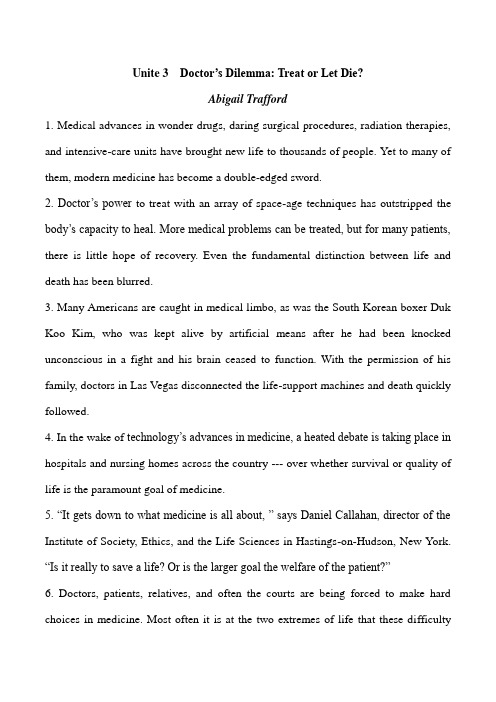
Unite 3 Doctor’s Dilemma: Treat or Let Die?Abigail Trafford1. Medical advances in wonder drugs, daring surgical procedures, radiation therapies, and intensive-care units have brought new life to thousands of people. Yet to many of them, modern medicine has become a double-edged sword.2. Doctor’s power to treat with an array of space-age techniques has outstripped the body’s capacity to heal. More medical problems can be treated, but for many patients, there is little hope of recovery. Even the fundamental distinction between life and death has been blurred.3. Many Americans are caught in medical limbo, as was the South Korean boxer Duk Koo Kim, who was kept alive by artificial means after he had been knocked unconscious in a fight and his brain ceased to function. With the permission of his family, doctors in Las Vegas disconnected the life-support machines and death quickly followed.4. In the wake of technology’s advances in medicine, a heated debate is taking place in hospitals and nursing homes across the country --- over whether survival or quality of life is the paramount goal of medicine.5. “It gets down to what medicine is all about, ” says Daniel Callahan, director of the Institute of Society, Ethics, and the Life Sciences in Hastings-on-Hudson, New York. “Is it really to save a life? Or is the larger goal the welfare of the patient?”6. Doctors, patients, relatives, and often the courts are being forced to make hard choices in medicine. Most often it is at the two extremes of life that these difficultyethical questions arise --- at the beginning for the very sick newborn and at the end for the dying patient.7. The dilemma posed by modern medical technology has created the growing new discipline or bioethics. Many of the country’s 127 medical s chools now offer courses in medical ethics, a field virtually ignored only a decade ago. Many hospitals have chaplains, philosophers, psychiatrists, and social workers on the staff to help patients make crucial decisions, and one in twenty institutions has a special ethics committee to resolve difficult cases.Death and Dying8. Of all the patients in intensive-care units who are at risk of dying, some 20 percent present difficult ethical choices --- whether to keep trying to save the life or to pull back and let the patient die. In many units, decisions regarding life-sustaining care are made about three times a week.9. Even the definition of death has been changed. Now that the heart-lung machine can take over the functions of breathing and pumping blood, death no longer always comes with the patient’s “last gasp” or when the heart stops beating. Thirty-one states and the District of Columbia have passed brain-death statutes that identify death as when the whole brain ceases to function.10. More than a do zen states recognize “living wills” in which the patients leave instructions to doctors not to prolong life by feeding them intravenously or by other methods if their illness becomes hopeless. A survey of California doctors showed that 20 to 30 percent were following instructions of such wills. Meanwhile, the hospicemovement, which its emphasis on providing comfort --- not cure --- to the dying patient, has gained momentum in many areas.11. Despite progress in society’s understanding of death and dying, t heory issues remain. Example: A woman, 87, afflicted by the nervous-system disorder of Parkinson’s disease, has a massive stroke and is found unconscious by her family. Their choices are to put her in a nursing home until she dies or to send her to a medical center for diagnosis and possible treatment. The family opts for a teaching hospital in New York city. Tests show the woman’s stroke resulted from a blood clot that is curable with surgery. After the operation, she says to her family: “Why did you bring me back to this agony?” Her health continues to worsen, and two years later she dies.12. On the other hand, doctors say prognosis is often uncertain and that patients, just because they are old and disabled, should not be denied life-saving therapy. Ethicists also fear that under the guise of medical decision not to treat certain patients, death may become too easy, pushing the country toward the acceptance of euthanasia.13. For some people, the agony of watching high-technology dying is too great. Earlier this year, Woodrow Wilson Collums, a retired dairyman from Poteet, Texas, was put on probation for the mercy killing of his older brother Jim, who lay hopeless in his bed at a nursing home, a victim of severe senility resul ting from Alzheimer’s disease. After the killing, the victim’s widow said: “I think God, Jim’s out of his misery. I hate to think it had to be done the way it was done, but I understand it. ”Crisis in Newborn Care14. At the other end of the life span, technology has so revolutionized newborn carethat it is no longer clear when human life is viable outside the womb. Newborn care has got huge progress, so it is absolutely clear that human being can survive independently outside the womb. Twenty-five years ago, infants weighting less than three and one-half pounds rarely survived. The current survival rate is 70 percent, and doctors are “salvaging” some babies that weigh only one and one-half pounds. Tremendous progress has been made in treating birth deformities such as spina bifida. Just ten years ago, only 5 percent of infants with transposition of the great arteries --- the congenital heart defect most commonly found in newborns --- survived. Today, 50 percent live.15. Yet, for many infants who owe their lives to new medical advances, survival has come at a price. A significant number emerge with permanent physical and mental handicaps.16. “The question of treatment and nontreatment of seriously ill newborns is not a single one,”says Thomas Murray of the Hastings Center. “But I feel strongly that retardation or the fact that someone is going to be less than perfect is not good grounds for allowing an infant to die.”17. For many parents, however, the experience of having a sick newborn becomes a lingering nightmare. Two years ago, an Atlanta mother gave birth to a baby suffering from Down’s Syndrome, a form of mental retardation; the child also had blocked intestines. The doctors rejected the parents’ plea not to operate, and today the child, severely retarded, still suffers intestinal problems.18. “Every time Melanie has a bowel movement, she cries,” explains her mother.“She’s not able to take care of herself, and we won’t live forever. I wanted to save her from sorrow, pain, and suffering. I don’t understand the emphasis on life at all costs, and I’m very angry at the doctors and the hospital. Who will take care of Melanie after we’re gone? Where will you doctors be then?”Changing Standards19. The choices posed by modern technology have profoundly changed the practice of medicine. Until now, most doctors have been activists, trained to use all the tools in their medical arsenals to treat disease. The current trend is toward nontreatment as doctors grapple with questions not just of who should get care but when to take therapy away.20. Always in the background is the threat of legal action. In August, two California doctors were charged with murdering a comatose patient by allegedly disconnecting the respirator and cutting off food and water. In 1981, a Massachusetts nurse was charged with murdering a cancer patient with massive doses of morphine but was subsequently acquitted.21. Between lawsuits, government regulations, and patients’ rights, many doctors feel they are under siege. Modern technology actually has limited their ability to make choices. More recently, these actions are resolved by committees.Public Policy22. In recent years, the debate on medical ethics has moved to the level of national policy. “It’s just beginning to hit us that we don’t have unlimited resources,” says Washington Hospital Center’s Dr. Lynch. “You can’t talk about ethics without talkingethics without talking about money.”23. Since 1972. Americans have enjoyed unlimited access to a taxpayer-supported, kidney dialysis program that offers life-prolonging therapy to all patients with kidney failure. To a number of police analysts, the program has grown out of control --- to a $1.4billion operation supporting 61,000 patients. The majority are over 50, and about a quarter have other illness, such as cancer or heart disease, conditions that could exclude them from dialysis in other countries.24. Some hospitals are pulling back from certain lifesaving treatment. Massachusetts General Hospital, for example, has decided not perform heart transplants on the ground that the high costs of providing such surgery help too few patients. Burn units --- through extremely effective --- also provide very expensive therapy for very few patients.25. As medical scientists push back the frontiers of therapy, the moral dilemma will continue to grow for doctors and patients alike, making the choice of to treat the basic question in modern medicine.1. 在特效药、风险性手术进程、放疗法以及特护病房方面的医学进展已为数千人带来新生。
研究生科技英语阅读课文翻译(1-10).
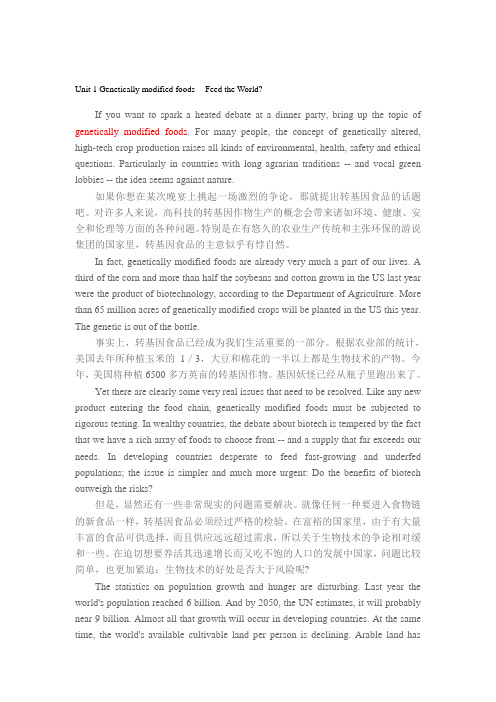
Unit 1 Genetically modified foods -- Feed the World?If you want to spark a heated debate at a dinner party, bring up the topic of genetically modified foods. For many people, the concept of genetically altered, high-tech crop production raises all kinds of environmental, health, safety and ethical questions. Particularly in countries with long agrarian traditions -- and vocal green lobbies -- the idea seems against nature.如果你想在某次晚宴上挑起一场激烈的争论,那就提出转基因食品的话题吧。
对许多人来说,高科技的转基因作物生产的概念会带来诸如环境、健康、安全和伦理等方面的各种问题。
特别是在有悠久的农业生产传统和主张环保的游说集团的国家里,转基因食品的主意似乎有悖自然。
In fact, genetically modified foods are already very much a part of our lives. A third of the corn and more than half the soybeans and cotton grown in the US last year were the product of biotechnology, according to the Department of Agriculture. More than 65 million acres of genetically modified crops will be planted in the US this year. The genetic is out of the bottle.事实上,转基因食品已经成为我们生活重要的一部分。
研究生英语阅读教程课文全文参考译文
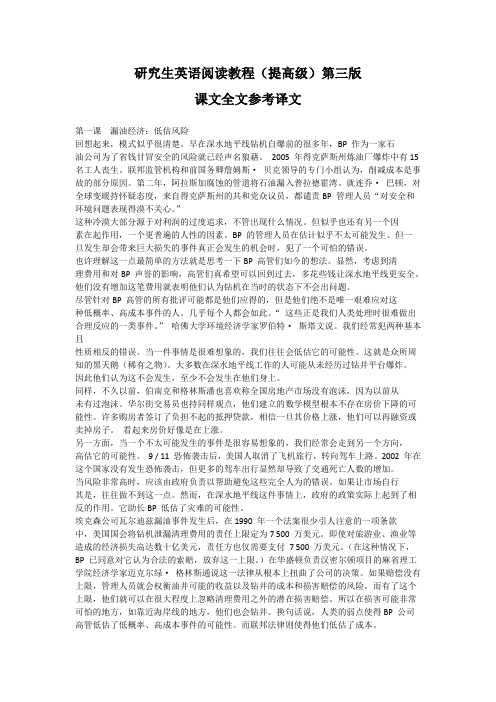
研究生英语阅读教程(提高级)第三版课文全文参考译文第一课漏油经济:低估风险回想起来,模式似乎很清楚。
早在深水地平线钻机自爆前的很多年,BP 作为一家石油公司为了省钱甘冒安全的风险就已经声名狼藉。
2005 年得克萨斯州炼油厂爆炸中有15 名工人丧生。
联邦监管机构和前国务卿詹姆斯·贝克领导的专门小组认为,削减成本是事故的部分原因。
第二年,阿拉斯加腐蚀的管道将石油漏入普拉德霍湾。
就连乔·巴顿,对全球变暖持怀疑态度,来自得克萨斯州的共和党众议员,都谴责BP 管理人员“对安全和环境问题表现得漠不关心。
”这种冷漠大部分源于对利润的过度追求,不管出现什么情况。
但似乎也还有另一个因素在起作用,一个更普遍的人性的因素。
BP 的管理人员在估计似乎不太可能发生、但一旦发生却会带来巨大损失的事件真正会发生的机会时,犯了一个可怕的错误。
也许理解这一点最简单的方法就是思考一下BP 高管们如今的想法。
显然,考虑到清理费用和对BP 声誉的影响,高管们真希望可以回到过去,多花些钱让深水地平线更安全。
他们没有增加这笔费用就表明他们认为钻机在当时的状态下不会出问题。
尽管针对BP 高管的所有批评可能都是他们应得的,但是他们绝不是唯一艰难应对这种低概率、高成本事件的人。
几乎每个人都会如此。
“这些正是我们人类处理时很难做出合理反应的一类事件。
”哈佛大学环境经济学家罗伯特·斯塔文说。
我们经常犯两种基本且性质相反的错误。
当一件事情是很难想象的,我们往往会低估它的可能性。
这就是众所周知的黑天鹅(稀有之物)。
大多数在深水地平线工作的人可能从未经历过钻井平台爆炸。
因此他们认为这不会发生,至少不会发生在他们身上。
同样,不久以前,伯南克和格林斯潘也喜欢称全国房地产市场没有泡沫,因为以前从未有过泡沫。
华尔街交易员也持同样观点,他们建立的数学模型根本不存在房价下降的可能性。
许多购房者签订了负担不起的抵押贷款,相信一旦其价格上涨,他们可以再融资或卖掉房子。
研究生科技英语阅读课文翻译10

1 Playing video games before bedtime may give people an unusual level of awareness and control in their dreams, LiveScience has learned.LiveScience网站获悉,在睡觉之前玩视频游戏可以让人们有一种不寻常的清醒做梦和控制梦的水平。
2 That ability to shape the alternate reality of dream worlds might not match mind-bending Hollywood films such as "The Matrix," but it could provide an edge when fighting nightmares or even mental trauma.尽管这种塑造现实品梦境的能力与让令人费神才能理解的好莱坞电影《黑客帝国》不同,但它还是能为与噩梦和心理创伤斗争的提供一点优势。
3 Dreams and video games both represent alternate realities, according to Jayne Gackenbach, a psychologist at Grant MacEwan University in Canada. But she pointed out that dreams arise biologically from the human mind, while video games are technologically driven by computers and gaming consoles.据加拿大Grant MacEwan大学的心理学家Jayne Gackenbach说,梦和视频游戏都代表另一种现实。
中国科学院大学研究生学术英语读写教程课文翻译
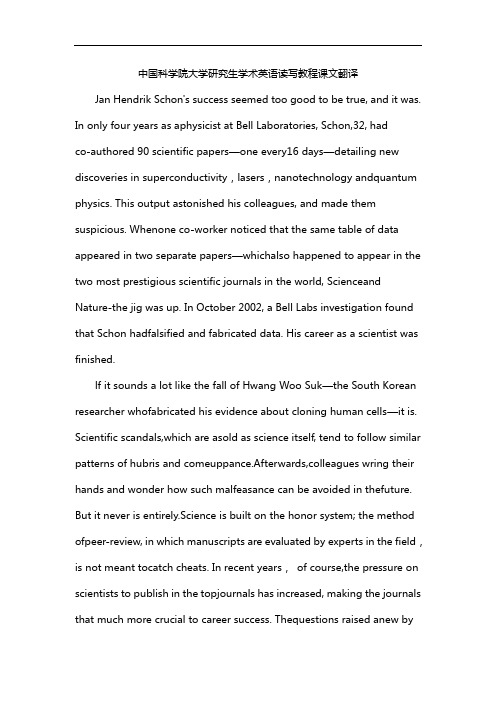
中国科学院大学研究生学术英语读写教程课文翻译Jan Hendrik Schon's success seemed too good to be true, and it was. In only four years as aphysicist at Bell Laboratories, Schon,32, hadco-authored 90 scientific papers—one every16 days—detailing new discoveries in superconductivity,lasers,nanotechnology andquantum physics. This output astonished his colleagues, and made them suspicious. Whenone co-worker noticed that the same table of data appeared in two separate papers—whichalso happened to appear in the two most prestigious scientific journals in the world, Scienceand Nature-the jig was up. In October 2002, a Bell Labs investigation found that Schon hadfalsified and fabricated data. His career as a scientist was finished.lf it sounds a lot like the fall of Hwang Woo Suk—the South Korean researcher whofabricated his evidence about cloning human cells—it is. Scientific scandals,which are asold as science itself, tend to follow similar patterns of hubris and comeuppance.Afterwards,colleagues wring their hands and wonder how such malfeasance can be avoided in thefuture. But it never is entirely.Science is built on the honor system; the method ofpeer-review, in which manuscripts are evaluated by experts in the field,is not meant tocatch cheats. In recent years,of course,the pressure on scientists to publish in the topjournals has increased, making the journals that much more crucial to career success. Thequestions raised anew byHwang's fall are whether Nature and Science have become toopowerful as arbiters of what science reaches the public, and whether the journals are up totheir task as gatekeepers.Each scientific specialty has its own set of journals. Physicists have Physical ReviewLetters,cell biologists have Cell,neuroscientists have Neuron, and so forth.Science andNature,though,are the only two major journals that cover the gamut of scientificdisciplines,from meteorology and zoology to quantum physics and chemistry.As a result,journalists look to them each week for the cream of the crop of new science papers. Andscientists look to the journals in part to reach journalists. Why do they care?Competitionfor grants has gotten so fierce that scientists have sought popular renown to gain an edgeover their rivals. Publication in specialized journals will win the accolades of academicsand satisfy the publish-or-perish imperative, but Science and Nature come with the addedbonus of potentially getting your paper written up in The New York Times and otherpublications.Scientists are also trying to reach other scientists through Science and Nature, not just thepublic.The line between popular and professional notoriety is not distinct. Scientists tendto pay more attention to the Big Two than to other journals. When more scientists knowabout a particular paper, they're more apt to cite it in their own papers. Being oft-citedwillincrease a scientist's "Impact Factor", a measure of how often papers are cited by peers.Funding agencies use the Impact Factor as a rough measure of the influence of scientiststhey're considering supporting.Because Nature and Science papers have more visibility, thenumber of submissions is growing, say the editors. Nature now gets 10,000 manuscripts ayear,and that figure is rising, says editor-in-chief Phiip Campbell via email. "This partlyreflects the increase in scientific activity around the world," he says. "It also no doubtreflects the increasing and sometimes excessive emphasis amongst funding agencies andgovernments on publication measures, such as the typical rates of citation of journals."Whatever the reasons, the whims of the editors at Science and Nature loom large for manyscientists. When either magazine is considering a paper for publication, the authors are toldnot to speak to the press lest they want to risk rejection."Every scientists hates them andloves them," says a prominent scientist who would not speak for attribution for fear ofoffending the editors. "We hate them because it's so political to get an article in them.Frankly I'm astonished at some of the things they accept,and some of the things theyreject."Whether the clamor to appear in these journals has any bearing on their ability to catchfraud is another matter. The fact is,fraud is terrifically hard to spot.Consider the processScience used to evaluate Hwang's 2005article. Science editors recognized the manuscript'simport almost as soon as it arrived.As part of the standard procedure, they sent it to twomembers of its Board of Reviewing Editors,who recommended that it go out for peerreview (about 30 percent of manuscripts pass this test). This recommendation was made。
现代大学英语精读6(1-10课)课文翻译

现代大学英语精读6(1-10课)课文翻译现代大学英语精读6课文翻译1如何使我们不为穷人的存在而内疚约翰·肯尼斯·高伯瑞(加尔布雷斯)1. 我很愿意严肃地考虑一种人类最古老的活动,这项活动持续了多年,实际上已经超过了几个世纪,那就是尝试怎样使我们不为穷人的存在而内疚。
2. 贫穷和富有从一开始就共生在一起,彼此很不愉快有时还充满危险。
普鲁塔克曾说,“贫富失衡乃共和政体最致命的宿疾。
”富有和贫穷持续共存产生的问题,特别是如何证明在其他人还贫穷时我们富有是有道理的这一问题,成为有思想有学问的人几百年来孜孜不倦地思考探索的问题。
直至当代状况依然如此。
3. 《圣经》提出了最初的解决之道,在现世遭受贫穷的人来世会得到更好的回报。
他们的贫穷是暂时的灾难,如果贫穷但却能顺从,他们将来就会成为世界的主人。
在某种程度上这就是最理想的解决办法。
由此,富人就可以一边嫉妒穷人的美好前途一边享受他们的财富。
4. 很长时间之后,即在1776年《国富论》发表的二三十年之后——在英国工业革命开始之后,贫富不均的问题及其解决办法开始具有了现代的形式。
杰罗米·边沁,这位与亚当·斯密几乎是同时代的人,提出了这样一种准则,在某种程度上,美国人认为这一准则在英国几乎50年来一直影响显著。
这就是实用主义学说。
“通过实用的原则,”边沁在1789年指出,“也就是通过这一原则来赞成或否定任何一种应运而生的看来似乎必定会增加或减少政党幸福的行为或做法,尽管政党的利益总是在讨论之中。
”实用,实际上一定是以自我为中心的。
然而,社会中只有少数人拥有大量财富,却有更多人没有财富。
只要遵循边沁的话——“最大的利益给最多的人”,就能够解决社会问题。
社会尽力满足更多的人,人们接受对于很多利益没被满足的人来说,结果极其不幸。
5. 在19世纪30年代,一种新的准则成为使我们不为穷人的存在感到内疚的有效办法,迄今为止它的影响也丝毫没有减弱。
博士研究生英语精读教案资料翻译4-6课(中科院)

第四课科学的事实:如何与基督徒的信仰协调?Scientific Facts: Compatible with Christian Faith?有人会认为,科学与基督教之间不必要的争斗已在很久之前完满结束。
然而,科学家及神学家近年的言论显示他们并不认同这看法。
例如, Richard Dawkins ——一位敢言的无神论者——认为「达尔文使成为知性上完满的无神论者变得可能」。
在神学界方面,一个基要派的基督徒组织 Institute of Creation Research (ICR) 不断出版反进化论的刊物,其中提及「……爬虫类动物进化成哺乳类动物,是科学上不能接纳的主张」。
有趣的是,正如 ICR 过去的出版物都有瑕疵一样,这些言论在科学界比起反基督教的科学家在神学界更广为人知。
科学与基督教争斗的原因可追溯至三个错误。
首先,双方的支持者都无法介定「进化」一词。
此外,双方都不能接受科学是基督徒世界观的一种产物。
最后,双方对科学与神学的限制都产生混淆。
甚么是进化?The American Scientific Affiliation 出版了一本超卓的著作,名为Teaching Science in a Climate of Controversy ,对象是任教高中科学的老师。
书中对「进化」有五个解释。
微观进化 ( 即在繁殖项目中产生杂交品种,或因适应环境而产生轻微变化的品种 ) 经常发生。
宏观进化 ( 即假设人类从单细胞或无机混合物进化而来 ) 的学说并不明显,争议性亦较高。
最后,「进化」有时被视为自然主义者的富宗教色彩的信念,认为「人类是无目的及自然过程中的产物」。
只有少数人 ( 如果有的话 ) 会否认,随着时间的过去,植物界及动物界会有轻微的变化。
相反地,只有少数人会认为人类 ( 以及宇宙中其余的生物 ) 只是随机而来的产物。
当一些生物学家把宏观进化论的假设指为「事实」时,他们会歪曲证据或掩饰事情的真相。
博士英语课文翻译Unit1
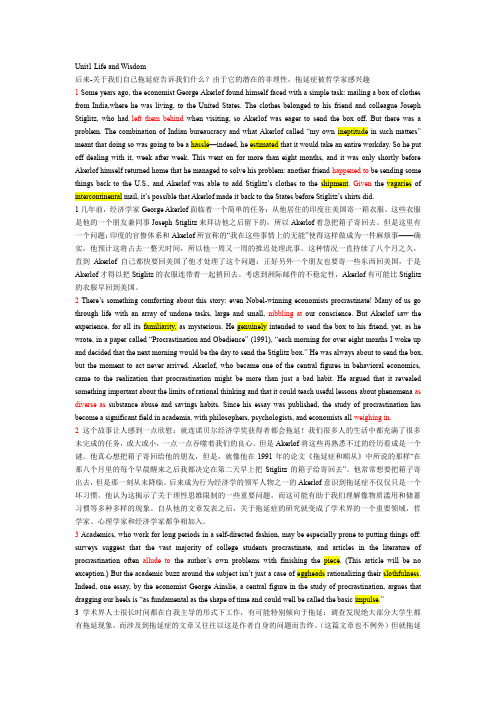
Unit1 Life and Wisdom后来-关于我们自己拖延症告诉我们什么?由于它的潜在的非理性,拖延症被哲学家感兴趣1 Some years ago, the economist George Akerlof found himself faced with a simple task: mailing a box of clothes from India,where he was living, to the United States. The clothes belonged to his friend and colleague Joseph Stiglitz, who had left them behind when visiting, so Akerlof was eager to send the box off. But there was a problem. The combination of Indian bureaucracy and what Akerlof called “my own ineptitude in such matters” meant that doing so was going to be a hassle—indeed, he estimated that it would take an entire workday. So he put off dealing with it, week after week. This went on for more than eight months, and it was only shortly before Akerlof himself returned home that he managed to solve his problem: another friend happened to be sending some things back to the U.S., and Akerlof was able to add Stiglitz’s clothes to the shipment. Given the vagaries of intercontinental mail, it’s possible that Akerlof made it back to the States before Stiglitz’s shirts did.1几年前,经济学家George Akerlof面临着一个简单的任务:从他居住的印度往美国寄一箱衣服。
(整理)中科院博士研究生英语精读教材翻译4-6课.

第四课科学的事实:如何与基督徒的信仰协调?Scientific Facts: Compatible with Christian Faith?有人会认为,科学与基督教之间不必要的争斗已在很久之前完满结束。
然而,科学家及神学家近年的言论显示他们并不认同这看法。
例如, Richard Dawkins ——一位敢言的无神论者——认为「达尔文使成为知性上完满的无神论者变得可能」。
在神学界方面,一个基要派的基督徒组织 Institute of Creation Research (ICR) 不断出版反进化论的刊物,其中提及「……爬虫类动物进化成哺乳类动物,是科学上不能接纳的主张」。
有趣的是,正如 ICR 过去的出版物都有瑕疵一样,这些言论在科学界比起反基督教的科学家在神学界更广为人知。
科学与基督教争斗的原因可追溯至三个错误。
首先,双方的支持者都无法介定「进化」一词。
此外,双方都不能接受科学是基督徒世界观的一种产物。
最后,双方对科学与神学的限制都产生混淆。
甚么是进化?The American Scientific Affiliation 出版了一本超卓的著作,名为Teaching Science in a Climate of Controversy ,对象是任教高中科学的老师。
书中对「进化」有五个解释。
微观进化 ( 即在繁殖项目中产生杂交品种,或因适应环境而产生轻微变化的品种 ) 经常发生。
宏观进化 ( 即假设人类从单细胞或无机混合物进化而来 ) 的学说并不明显,争议性亦较高。
最后,「进化」有时被视为自然主义者的富宗教色彩的信念,认为「人类是无目的及自然过程中的产物」。
只有少数人 ( 如果有的话 ) 会否认,随着时间的过去,植物界及动物界会有轻微的变化。
相反地,只有少数人会认为人类 ( 以及宇宙中其余的生物 ) 只是随机而来的产物。
当一些生物学家把宏观进化论的假设指为「事实」时,他们会歪曲证据或掩饰事情的真相。
科技英语阅读课文翻译及部分课文摘要Unit1-10
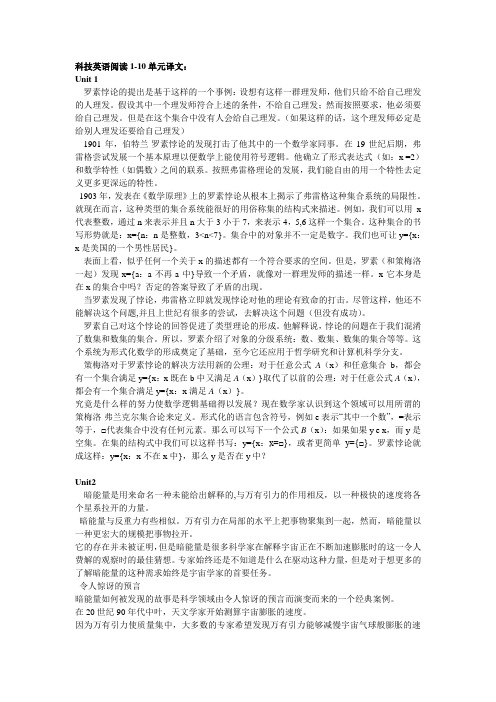
科技英语阅读1-10单元译文:Unit 1罗素悖论的提出是基于这样的一个事例:设想有这样一群理发师,他们只给不给自己理发的人理发。
假设其中一个理发师符合上述的条件,不给自己理发;然而按照要求,他必须要给自己理发。
但是在这个集合中没有人会给自己理发。
(如果这样的话,这个理发师必定是给别人理发还要给自己理发)1901年,伯特兰·罗素悖论的发现打击了他其中的一个数学家同事。
在19世纪后期,弗雷格尝试发展一个基本原理以便数学上能使用符号逻辑。
他确立了形式表达式(如:x =2)和数学特性(如偶数)之间的联系。
按照弗雷格理论的发展,我们能自由的用一个特性去定义更多更深远的特性。
1903年,发表在《数学原理》上的罗素悖论从根本上揭示了弗雷格这种集合系统的局限性。
就现在而言,这种类型的集合系统能很好的用俗称集的结构式来描述。
例如,我们可以用x 代表整数,通过n来表示并且n大于3小于7,来表示4,5,6这样一个集合。
这种集合的书写形势就是:x={n:n是整数,3<n<7}。
集合中的对象并不一定是数字。
我们也可让y={x:x是美国的一个男性居民}。
表面上看,似乎任何一个关于x的描述都有一个符合要求的空间。
但是,罗素(和策梅洛一起)发现x={a:a不再a中}导致一个矛盾,就像对一群理发师的描述一样。
x它本身是在x的集合中吗?否定的答案导致了矛盾的出现。
当罗素发现了悖论,弗雷格立即就发现悖论对他的理论有致命的打击。
尽管这样,他还不能解决这个问题,并且上世纪有很多的尝试,去解决这个问题(但没有成功)。
罗素自己对这个悖论的回答促进了类型理论的形成。
他解释说,悖论的问题在于我们混淆了数集和数集的集合。
所以,罗素介绍了对象的分级系统:数、数集、数集的集合等等。
这个系统为形式化数学的形成奠定了基础,至今它还应用于哲学研究和计算机科学分支。
策梅洛对于罗素悖论的解决方法用新的公理:对于任意公式A(x)和任意集合b,都会有一个集合满足y={x:x既在b中又满足A(x)}取代了以前的公理:对于任意公式A(x),都会有一个集合满足y={x:x满足A(x)}。
现代大学英语精读1第二版1-10课文翻译

2014101018课文翻译(Unit1——10)第一单元Transla tion of Text A半日1我走在父亲的一侧,牢牢地抓着他的右手。
我身上穿的,戴的全是新的:黑鞋子,绿校服,红帽子。
然儿我一点儿也高兴不起来,因为今天我将第一次被扔到学校里去。
2母亲站在窗前望着我们缓缓前行,我也不时的回头看她,希望她会救我。
我们沿着街道走着,街道两旁是花园和田野,田野里栽满了梨树和椰枣树。
3“我为什么要去上学?”我问父亲,“是我做错了什么了吗?”4“我不是在惩罚你,”父亲笑着说道,“上学不是一种惩罚。
学校是把孩子培养成才的地方。
难道你不想象你哥哥们那样,成为一个有用的人吗?”5我不相信他的话。
我才不相信把我从家里拽出来,扔进那个大大的,高墙围绕的建筑里对我有什么真正的好处呢。
6到了学校门口,我们看到了宽阔的庭院,站满了孩子。
“自己进去吧,”我父亲说,“加入他们。
笑一笑,给其他的孩子做个好榜样。
”7我紧抓着父亲的手,犹豫不决。
但是父亲却把我轻轻地推开了。
“拿出点男子气概来,”他说,“从今天起你就要真正开始自己的生活了。
放学时我会在这等你的。
”8我走了几步,便看见了一些孩子的面孔。
他们中我一个也不认识。
他们也没有一个认识我的。
我感觉自己像是一个迷了路的陌生人。
然而这时有些男孩开始好奇的打量我,其中一个走过来问到,“谁带你来的?”9“我爸爸”我小声说道。
10“我爸爸死了,”他简短地说。
11我不知道该说些什么。
这时学校的门已经关上了,有些孩子哭了起来。
接着,铃响了,一位女士走了过来,后面跟着一群男人。
那些人把我们排成几行。
使我们形成一个错综复杂的队行,站在那四周高楼耸立的院子里。
每层楼都有长长的阳台,阳台上带有木制顶棚,从阳台上可以俯视到我们。
12“这是你们的新家,”那位女士说道,“这儿有你们的父母。
研究生精读英语教程译文(一)
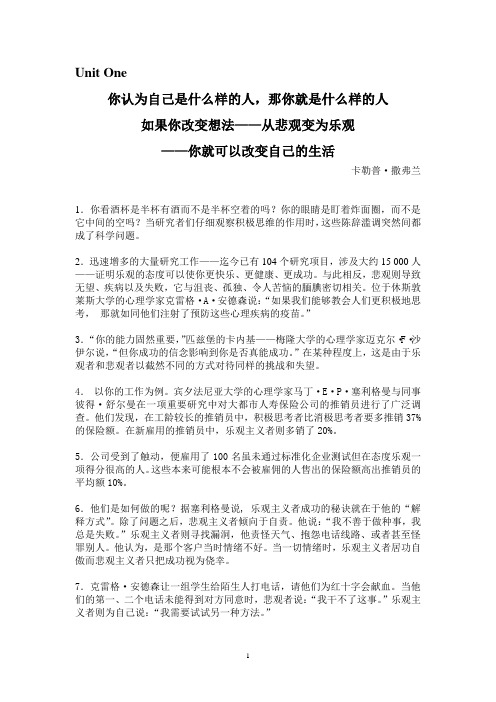
Unit One你认为自己是什么样的人,那你就是什么样的人如果你改变想法——从悲观变为乐观——你就可以改变自己的生活卡勒普·撒弗兰1.你看酒杯是半杯有酒而不是半杯空着的吗?你的眼睛是盯着炸面圈,而不是它中间的空吗?当研究者们仔细观察积极思维的作用时,这些陈辞滥调突然间都成了科学问题。
2.迅速增多的大量研究工作——迄今已有104个研究项目,涉及大约15 000人——证明乐观的态度可以使你更快乐、更健康、更成功。
与此相反,悲观则导致无望、疾病以及失败,它与沮丧、孤独、令人苦恼的腼腆密切相关。
位于休斯敦莱斯大学的心理学家克雷格·A·安德森说:“如果我们能够教会人们更积极地思考,那就如同他们注射了预防这些心理疾病的疫苗。
”3.“你的能力固然重要,”匹兹堡的卡内基——梅隆大学的心理学家迈克尔·F·沙伊尔说,“但你成功的信念影响到你是否真能成功。
”在某种程度上,这是由于乐观者和悲观者以截然不同的方式对待同样的挑战和失望。
4.以你的工作为例。
宾夕法尼亚大学的心理学家马丁·E·P·塞利格曼与同事彼得·舒尔曼在一项重要研究中对大都市人寿保险公司的推销员进行了广泛调查。
他们发现,在工龄较长的推销员中,积极思考者比消极思考者要多推销37%的保险额。
在新雇用的推销员中,乐观主义者则多销了20%。
5.公司受到了触动,便雇用了100名虽未通过标准化企业测试但在态度乐观一项得分很高的人。
这些本来可能根本不会被雇佣的人售出的保险额高出推销员的平均额10%。
6.他们是如何做的呢?据塞利格曼说, 乐观主义者成功的秘诀就在于他的“解释方式”。
除了问题之后,悲观主义者倾向于自责。
他说:“我不善于做种事,我总是失败。
”乐观主义者则寻找漏洞,他责怪天气、抱怨电话线路、或者甚至怪罪别人。
他认为,是那个客户当时情绪不好。
当一切情绪时,乐观主义者居功自傲而悲观主义者只把成功视为侥幸。
- 1、下载文档前请自行甄别文档内容的完整性,平台不提供额外的编辑、内容补充、找答案等附加服务。
- 2、"仅部分预览"的文档,不可在线预览部分如存在完整性等问题,可反馈申请退款(可完整预览的文档不适用该条件!)。
- 3、如文档侵犯您的权益,请联系客服反馈,我们会尽快为您处理(人工客服工作时间:9:00-18:30)。
因此,把科学作为能够包围和消除一切重要无知领域的不断扩充的知识的这种观念只不过是一种错觉。科学家和哲学家正在认识到,把科学简单的看成先观察,然后根据观察的结果总结成理论再被随后的实验验证的过程,这是很幼稚的。已故的科学哲学先驱,在他年的著作《科学知识的发展》中提到,科学起源于问题而非观察,每个有真实价值的新科学理论都引出新的问题。因此不用担心科学会因完成它的使命而走到尽头,这归功于无穷无尽的未知。
实际上,一些杰出的科学家已经表达了这样的观点。年伟大的物理学家在芝加哥大学的一个演讲中讲到:虽然不能断言未来的物理学不会再取得比过去更惊人的成就,但很可能大多数的重要的基本原理都已经牢固的确立了,那么,进一步的发展将可能主要是如何将这些基本原理精确地应用到我们注意的现象上去。人们很难在物理学领域再作突破。
至少自从在年出版了《科学革命史》一书以来,人们普遍认为观测只不过是科学理论的结果,这种观点常常被和其他哲学家拿来作范例,这是由于如果没有恰当的和不恰当的理论,要做什么样观察就将没有决定基础。既然没有任何人能够知道一切,那么在某一领域获得全面的了解(有时是权威的观点)只不过达到一种判断(境界),即另外的信息都不重要了,不值得去费神求证和考虑了。
生物和生命科学的发展过程与物理学的发展过程相似,只是它的发生晚了几个世纪。生物进化论第一次引起科学家的注意是在年达尔文的“物种起源“的出版。但是达尔文没有解释造成性状遗传和变异的原因。孟德尔在年和年发表的论文中运用了基于基因的数学理论解释了这些原因。
按照的观点ห้องสมุดไป่ตู้医学是最年轻的科学,二十世纪三十年代才成为真正的科学。正在进行的和将要进行的研究产生了很多不确定东西。有些是关于一些基本的概念,比如:生命是何时诞生的,是怎样诞生的,死亡会在什么时候发生;并且我们现在花费数十亿美元来设法了解我们对于人类的基因能够知道多少。现代医学显著的提高了我们的寿命和健康状况,而且随着研究过程的深入将来还会继续改善。但是新的问题的出现速度要比我们得到的研究成果的增长速度快得多,比如说在有关人类基因工程项目中所出现的大量的问题。
第课
人类从古类人猿进化到当前的状态这个长久的进化过程中的最大成就是有关于人类自身、世界以及宇宙众多知识的获得和积聚。这些知识的产物就是那些我们总称为“文化”的所有的东西,包括语言、科学、文学、艺术、所有的物质机器、仪器、我们所用的结构以及社会所依赖的物质基础设施。我们之中大多数人认为现代社会中各种知识在不断增长,与此同时社会或群体对新知识的积累也在稳步减少我们对人类自身、世界及宇宙的未知。然而,现有的无垠的未知领域在不断提示着我们需要批判性地分析这个设想。
尽管这些科学家和现代的其他科学家做出了卓越贡献并且对知识孜孜以求,但是在科学史上没有任何事情表明任何对于科学知识体系增加的数据和理论曾经给任何领域的所有问题提供答案。相反,科学史表明,增加的知识使人们认识到新的无知的领域并带来新的问题。
天文学是最古老的科学,它的发展是其他领域知识发展的模型。自从有史记载以来,人们一直在观察星星和天体。早在公元前年,巴比伦人认识了一定数量的星座。在第一个五千年或者更早一些的时间,天文学观察仅限于狭窄的可见光波长范围内。在过去的这半个世纪,天文学观察已经可以在电磁辐射波长(包括广播电波、红外、紫外、射线、伽玛射线)范围内进行,还可以通过大气层外的卫星来观察。可以毫不夸张地说,自从第二次世界大战以来收集的天文学数据,比在人类持续的几千年历史中收集的数据还要多。
然而,虽然仪器的应用有了长足的改进,由于计算机以及大量数据和知识的积累,分析和计算的复杂程度有了大幅度的提高,但是我们仍然难以预测出行星未来的运动以及另一些原理甚至是太阳系中被高度确定的原理。一个训练有素的科普作家以及科学新闻的编辑,在他的书“牛顿的时钟”里提到一种奇妙的细微的混乱弥漫着太阳系中。他写到:
两百多年以来,太阳系的稳定性问题以一种或是另一种方式吸引着并且困扰着天文学家和数学家。而这仍然是天体力学中最为困扰并且未能解决的问题,当代的科学家们对此也感到很尴尬。每一步对于此问题以及与此相关的问题的解决都会产生而外的不确定的问题甚至是更深的奥秘。
相似的问题在天文学中中也很流行。关于宇宙的最主要的两个理论,广义相对论以及量子力学不能够用形同的数学语言来表达,因此两者是不一致的,就像世纪时托勒密和哥白尼的理论一样,虽然当代的理论仍在被应用,但是所用的计算公式不同。牛津大学的数学家在他的书“新思想的帝国”中提到由于量子论中存在不可调和的争论,因此他提出了一种名为“修正的量子重力“理论”。
普遍的观点认为,智力的演变与身体的发育相似,虽然要快上许多。生物的进化经常被描述为“个体的进化重演物种的进化”,意思就是个体的胚胎在其从受精卵发展到人类胎儿的过程中经历了几个阶段,在这些阶段中个体胚胎类似人类物种的祖先形式。普遍的观点认为人类从天真无邪的状态进步的,这个状态可以比作婴儿,然后逐渐的获得越来越多的知识,就像一个小孩通过学习通过了教育体系的几个年级一样。这种观点中暗含着一种臆断,那就是种系发育类似个体发育,知识的积累最终能达到一个基本完整的阶段,至少在特定的领域中是如此,就好像社会已获得了所有的高等学位,这些学位表明它已经掌握了各个重要学科的知识。
在迈克尔逊讲述上一段话之后的一个世纪,科学家们在物理学上的发现远远超出了对小数点第六位测量的改进,而今天没有人会再进行与相似的阐述。但是仍有许多人坚持认为知识有迟早达到穷尽的可能性。英国伟大的科学家斯蒂芬·霍金在他的非常流行的<<时间简史>>一书中,推测得出以下结论,我们可以“发现一种终极理论,那将是人类理性的最终胜利,那时候我们将知道上帝在想什么”。澳大利亚物理学家保罗·戴维斯附和斯蒂芬·霍金的观点,在他的书名为《上帝的智慧》一书中提出人类才智能使人类掌握一些上帝的思想的一些秘密。其他一些同时代的科学家有提及“万物之理”,也就是解释所有可以观察到的物理现象的理论。物理理论的现代标准模型的构建者之一诺贝尔奖获得者斯蒂芬·温伯格则提到他的著作《终极理论之梦》。
